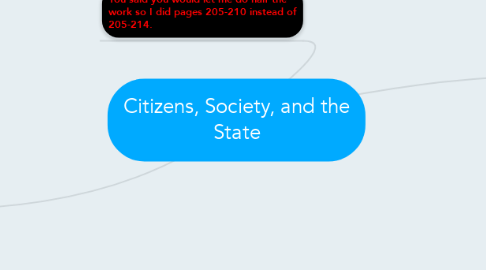
1. Cleavages
1.1. Nationality
1.1.1. 80% of the country is Russian. The country includes Tatars, Ukrainians, Armenians, Chuvashes, Bashkis, Byelorussians, and Moldavians.
1.1.2. Chechnya causes trouble to the Russian Gov: Muslim region fighting for its freedom.
1.2. Social Class
1.2.1. Due to nomenklatura, Communist Party heads and associates remain at the top of the social system.
1.2.2. Entrepreneurs are increasing in number in Russia along with the number of business opportunities.
1.3. Religion
1.3.1. During the rule of the tsars, most Russians considered themselves Russian Orthodox.
1.3.2. Today most are nonreligious, but identify with the Russian Orthodox Church.
1.3.3. Less popular religions include Roman Catholic, Jews, Muslims, and Protestants. (Muslim territory is expanding.
1.4. Comparison to Britain...
1.4.1. Britain is mostly Protestant and Catholic as opposed to the Russian Orthodox majority in Russia.
1.4.2. Russia is more divided in terms of wealth and living conditions. Britain offers more opportunity for lower class citizens to rise up and obtain wealth.
1.4.3. Russia is similar to Britain in that they both have a mostly domestic population. However, Russia has more Eastern European citizens, whereas Britain includes citizens from Western Europe and even the Middle East.
2. Beliefs and Attitudes
2.1. Economic Beliefs
2.1.1. Russia was divided in terms of how economic reform should take place. Yeltsin's Shock Therapy took the blame for economic downturn in the 1990's
2.2. Statism
2.2.1. Russians hold high expectations for the government. They feel the government has a responsibility to take an active role in their lives.
2.3. Westernization
2.3.1. Though many parties and groups support the introduction of western ideals into the Russian system, others feel that Russia should become a global player of its own.
2.4. Mistrust of the Gov
2.4.1. Most Russians have suspicions that the elections aren't truly democratic.
2.4.2. Citizens are "alienated" from the government.
2.5. Comparison to Britain...
2.5.1. British citizens believe strongly in a welfare state, and that the gpvernment has a respons
2.5.2. British people are characterized by western ideas and principles. Nationalism isn't as strong when it comes to modernization and progress.
2.5.3. British citizens don't have a strong mistrust of the government like Russians do. The elections are expected to be fair, and typically aren't always dominated by one party (being the communist party in Russia).

